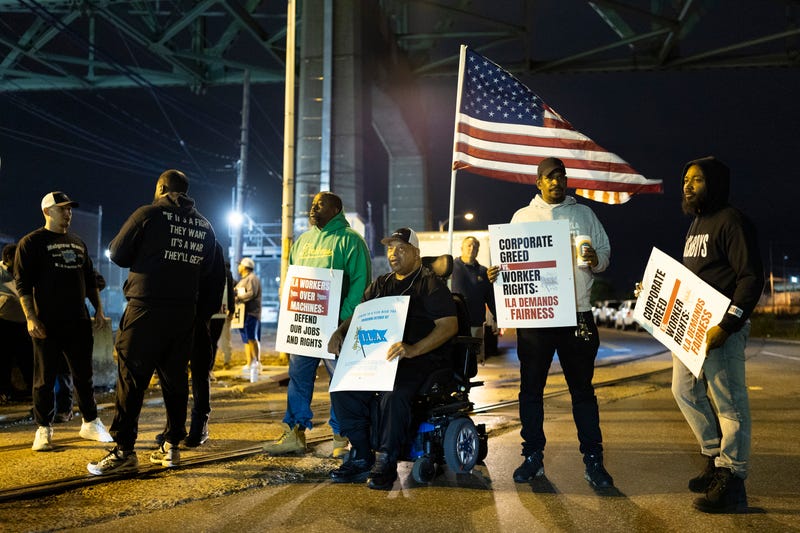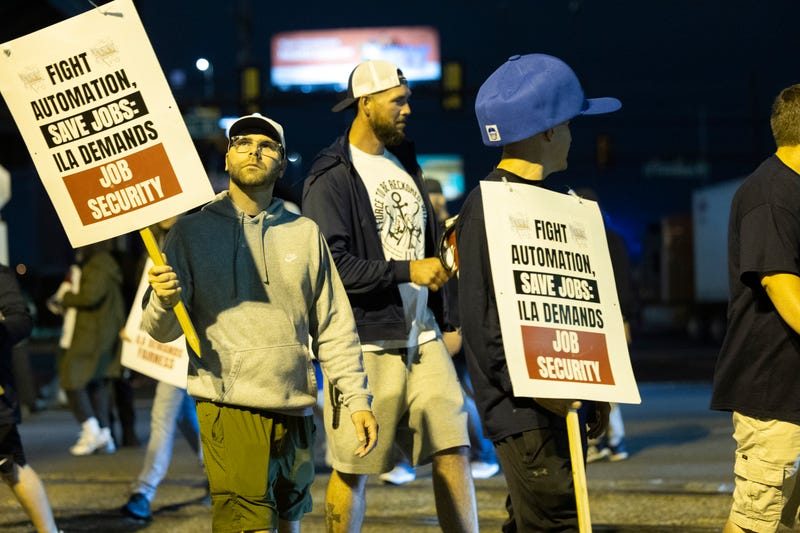
PHILADELPHIA (AP/KYW Newsradio) — Unionized dockworkers from Maine to Texas walked off the job Tuesday in a strike over wage demands and job protections — a move that could reignite inflation and cause shortages of goods if it goes on more than a few weeks.
The contract between the ports and about 45,000 members of the International Longshoremen’s Association (ILA) expired at midnight, and even though progress was reported in talks on Monday, the workers went on strike. The strike affecting 36 ports is the first by the union since 1977.
President Joe Biden said his administration is assessing ways to address any potential impact on the supply chain. An ongoing strike could drive up the price of everything from groceries to Christmas gift items.
About 45,000 workers are on strike across the U.S., including more than 400 in Philadelphia. Dozens of dockworkers started picketing outside the Port of Philadelphia early Tuesday morning. A truck with a screen on the side displayed various union messages, like, “Machines don’t feed families.”

“These folks starting to take us for granted. No more,” said Boise Butler, president of ILA Local 1291 in Philadelphia. “Our demands are to share and not to replace us with automation. … It’s really simple.”
The union’s main hangups at the bargaining table are wages and job automation. The U.S. Maritime Alliance, which represents the ports, said Monday night that both sides had moved off of their previous wage offers, but no deal was reached.
The union’s opening offer in the talks was for a 77% pay raise over the six-year life of the contract, with President Harold Daggett saying it’s necessary to make up for inflation and years of small raises. ILA members make a base salary of about $81,000 per year, but some can pull in over $200,000 annually with large amounts of overtime.
But Monday evening, the alliance said it had increased its offer to 50% raises over six years, and it pledged to keep limits on automation in place from the old contract. The union wants a complete ban on automation. It wasn’t clear just how far apart both sides are.

“We are hopeful that this could allow us to fully resume collective bargaining around the other outstanding issues in an effort to reach an agreement,” the alliance statement said.
In a statement early Tuesday, the union said it rejected the alliance’s latest proposal because it “fell far short of what ILA rank-and-file members are demanding in wages and protections against automation.” The two sides had not held formal negotiations since June.
“We are prepared to fight as long as necessary, to stay out on strike for whatever period of time it takes, to get the wages and protections against automation our ILA members deserve,” Daggett said in the statement. “They must now meet our demands for this strike to end.”
The alliance said its offer tripled employer contributions to retirement plans and strengthened health care options.
Supply chain experts say consumers won’t see an immediate impact from the strike because most retailers stocked up on goods, moving ahead with shipments of holiday gift items.
But if it goes more than a few weeks, a work stoppage would significantly snarl the nation’s supply chain, potentially leading to higher prices and delays in goods reaching households and businesses.
If drawn out, the strike will force businesses to pay shippers for delays and cause some goods to arrive late for peak holiday shopping season — potentially impacting delivery of anything from toys or artificial Christmas trees to cars, coffee and fruit.
The strike will likely have an almost immediate impact on supplies of perishable imports like bananas, for example. The ports affected by the strike handle 3.8 million metric tons of bananas each year, or 75% of the nation’s supply, according to the American Farm Bureau Federation.
It also could snarl exports from East Coast ports and create traffic jams at ports on the West Coast, where workers are represented by a different union. Railroads say they can ramp up to carry more freight from the West Coast, but analysts say they can’t move enough to make up for the closed Eastern ports.
J.P. Morgan estimated that a strike that shuts down East and Gulf coast ports could cost the economy $3.8 billion to $4.5 billion per day, with some of that recovered over time after normal operations resume.
The strike comes just weeks before the presidential election and could become a factor if there are shortages. Retailers, auto parts suppliers and produce importers had hoped for a settlement or that Biden would intervene and end the strike using the Taft-Hartley Act, which allows him to seek an 80-day cooling-off period.
But during an exchange with reporters on Sunday, Biden, who has worked to court union votes for Democrats, said “no” when asked if he planned to intervene in the potential work stoppage.
In the president’s statement, Biden said he and Vice President Kamala Harris believe collective bargaining is the fairest way for workers and employers to reach a fair agreement.
